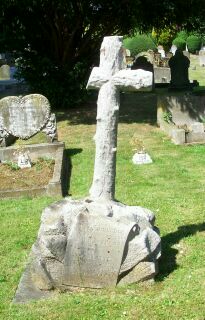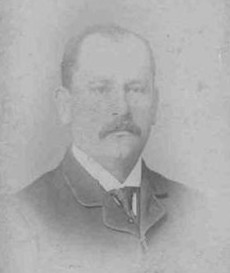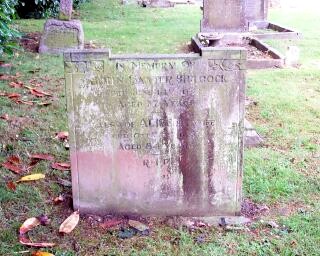|
THE SHILCOCK FAMILY
Robert
James Shilcock
(1823-1908)
John
Baxter Shilcock (1850-1927)
Frederick George
Shilcock (1855-1906)
The Shilcocks
were not an old Bourne family when they rose to prominence in the town
during the late 19th and early 20th centuries but they have left their mark and many descendants survive to this day.
The first was Robert James Shilcock who was born in July 1823 at
Helpringham, near Sleaford, the son of William Shilcock and his wife
Frances Elizabeth (née Baxter) who had married there on 10th March 1818.
Robert was the youngest of three children, having two elder sisters, and he moved to Bourne to
start his own business and had soon begun a successful career in milling and brewing. He married a local girl,
Charlotte Manby, daughter of John Manby, and they moved into a house in North Street where they raised a family and by 1876, Robert had become the owner of the Star Brewery that supplied many local public houses with their ale from their premises in Manning Road, the site
later occupied by Johnson Bros (Bourne) Ltd, the agricultural machinery engineers
and now developed as retirement homes.
He became well known in the community for his public work, mainly through his appointment as Overseer of the Poor and as a trustee of the Bourne Charities and he was also for many years a member of the Town Assessment Committee, the Burial Board and chairman of New Association for the Prosecution of Felons, a position he held for 40 years until the time of his death.
Robert Shilcock died at his home in North Road shortly after Christmas, on
Saturday 27th December 1908, at the age of 85 and the Stamford Mercury
recorded his passing with the words: "His death took place under
painfully sudden circumstances. He had been in failing health for some
time but up to a few days before his death, he was able to get out and his
death came as a shock not only to the members of his family, but also to
his large circle of friends, Mr Shilcock having been a prominent personage
in the general business affairs of the town."
The funeral took place the following Wednesday at the Abbey Church
and as the cortege passed by, all the blinds of the private houses along the route were drawn while shops and business premises put up their shutters. The coffin, of plain oak, bore the inscription:
Robert J Shilcock, died Dec. 27th, 1908, aged 85
years.
The service was followed by interment at the town cemetery and his wife Charlotte, who died on 21st April 1912 at the age of 87, is buried with
him although their tombstone has been damaged over the years. |
 |
Robert and Charlotte had a large family including three sons, the youngest of them John Baxter Shilcock, born in 1850, and who was destined to become the first chairman of the parish council and then the urban district council when both bodies were instituted during local government reforms in the closing years of the 19th century. He started work in the brewery as a boy and by 1875 was in sole charge.
In 1884, Robert Shilcock sold the brewing business in Manning Road to Joseph Wyles to concentrate on their other interests in North Street as wine, spirit and linseed cake merchants, millers and malsters, while son John was about to embark on a new career as a pub landlord. In 1872, he had married Alice
Thornton whose parents kept the Nag's Head in the Market Place and they went to live in a house at The Terrace in North Street. When her father died, Alice's widowed
mother, Mrs Maria Thornton, ran the pub for a while with her son Thomas and daughter Martha until John and his wife took over the tenancy about
1895. It proved to be an astute move for both of them because he was to preside as mine host for a quarter of
a century, proving to be not only a model landlord who increased custom dramatically in the bars of the public house, but also specialising in outside catering and there were few social occasions in Bourne for which he did not provide the food and drink which soon became a very profitable sideline.
Most of
John's time was now being taken up with his two consuming passions, the church and local affairs. His father Robert had been a long-serving churchwarden of the Abbey Church and when he retired, John was nominated as his successor but there were other nominations and when he won the subsequent vote at the vestry meeting, a poll of the parish was taken and he won by a large majority. The office of people's churchwarden was a prestigious one at that time and much sought after and it also carried with it a trusteeship of the Bourne United Charities, an appointment he held until four years before his death.
|
 |
 |
 |
|
 |
|
Three photographs of John Baxter Shilcock
at various
stages in his life and the Nag's Head Hotel
during the 19th century. |
His interest in community matters prompted him to stand for election to the first parish council ever formed in Bourne, following the Local Government Act of 1894, when he was second in the polls and when Bourne Urban District Council was formed in 1899, he became one of its first members and its very first chairman. Like his father, he was also for many years a member of the town's New Association for the Prosecution of Felons and was its vice-chairman for twenty years, as well as being secretary of the Whit-Monday Sports and Horse Show, the Fatstock Show Society and the Foal Show Society. John also maintained a keen interest in sport and was for many years the regular umpire for Bourne Town Cricket Club. Politically, he was Conservative but held democratic views on many subjects and was frequently outspoken on public matters.
But he was best known in the town as the landlord of the Nag's Head
which he and his wife Alice kept for 25 years. They had
six daughters, all renowned for their beauty and keenly sought in
marriage. Alice Mary (1873) married Dr Arthur Boulton from Horncastle in
1895, Annie Beatrice (1875) married Thomas Mays in 1898, Fanny
(1877) married Harry Dellow from Croydon in 1896, Martha Louise (1880)
married John Agnew from Sleaford in 1903, Ida Maud (1885) married Charles
Wiggin from County Cork in 1920 and Ethel, known as Effie (1887), married
Harold Twell in 1917.
|
The couple retired from the Nag's
Head in 1920 and went to live in North Road where John died on
14th June 1927, aged 77. His wife Alice survived him by ten years
and died on 9th October 1937 aged 84 and they are buried in the
same grave at the town cemetery.
Another son was Frederick George Shilcock, also a prominent
Bourne citizen, who was an architect, auctioneer and valuer, and at the
time of his unexpected death in 1906 at the age of 51, he was also an
official of Bourne Urban District Council. |
 |
He was born in September 1855 and after attending Bourne Grammar School,
became articled to an architect and returned to the town to start his own
business which he carried on for 26 years and when the BUDC was formed in
1899, he was appointed their surveyor and Inspector of Nuisances. In June 1884,
he married Mary Ann Hardwicke but there were no children. He was a staunch
Conservative although he took no active role in local politics, but he was
a churchman and tireless worker for the Abbey Church, frequently giving
his services in conducting auction sales at bazaars and garden fêtes both
for the Abbey Church and other denominations in the town. He was also a
freemason, holding all of the prominent positions in the Hereward Lodge,
and was keenly interested in sport, being a committee member of the annual
athletics held in Bourne and regular player for Bourne Cricket Club where
he also held office as captain and secretary.
His death shocked Bourne because he hanged himself at his office premises
in West Street. At that time, he was living with his wife at one of the
West Road Villas but on the evening of Saturday 18th August 1906, he did
not return home at the usual time and his wife became anxious and on going
out into the street to look for him, asked a gas company workman who was
extinguishing the street lights to call at the Nag’s Head Hotel and inform
the landlord, John Shilcock, her husband’s brother, that Frederick was
missing. A search was made of the town but without success and then his
clerk, Mr Robert Agnew, was called to search the firm’s offices.
It was now three o’clock in the morning but the door of the office was
locked from the inside and so they got in by smashing a window at the back
of the premises. Frederick’s hat was lying on a box inside and in a short
passage leading from the office, he was found hanging by the neck from a
rope suspended from a ladder in the loft, his knees almost touching the
ground. The body was cold and he was quite dead. A policeman, Constable
Bradshaw, arrived and cut it down and the family doctor, Dr John Gilpin,
arrived a few minutes later but his services were of no avail and he
decided that death had occurred several hours earlier.
There was no indication why he should take his own life and an inquest at
the Town Hall the following Monday evening failed to establish a motive.
John Shilcock told the hearing that his brother had been in failing
health for the past six months and had not been looking well recently but
he did not know if this was due to illness or worry. Frederick had always
been delicate and had at times suffered from faintness. He was, in fact,
nervous about his health and was of a very excitable nature. He did not
know if he had financial problems but if he had, it was doubtful if it
would have been mentioned to him.
The clerk Agnew said in evidence that he last saw his employer at about
11.15 am on Saturday when he appeared to be very restless. He left the
office saying he would be back in a few minutes but he had not returned
when he locked up at 1.15 pm. Both had keys to the office. When the body
was cut down, police found that the dead man had £5 5s in cash in his
pockets, a gold watch and chain and a number of business letters but none
contained any indication about his state of mind. Dr Gilpin, who had been
Shilcock’s doctor for the past 16 years, said that he had suffered no
illness with any lasting effects and he had no heart problems. His
judgement was sound but he was often excitable. He added: “From the
determined nature in which he had committed suicide, there must have been
impulsive insanity.” The jury returned a verdict that Shilcock hanged
himself while temporarily insane.
The funeral took place the following Tuesday afternoon and when the
cortege left West Road Villas, the blinds were drawn in the houses along
the route to the Abbey Church and shops and businesses were closed as a
mark of respect. After the church service conducted by the vicar, the Rev
Hugh Mansfield, he was buried in the town cemetery in an oak coffin with
brass fittings and covered with a mass of floral tributes with more
following behind in a separate vehicle. Crowds of sympathisers joined
friends and family in the church and at the graveside, including a large
contingent of fellow masons from the Hereward Lodge.
Soon after the funeral, Shilcock’s widow sold her husband’s auctioneering
business to Mr Arthur Saul.
|
AN APPEARANCE IN COURT
It was while he was landlord of
the Nag's Head that John Shilcock fell foul of the rationing
restrictions during the Great War of 1914-18 which lead to his
appearance before the magistrates in the police court at Bourne Town
Hall. On
Thursday 26th September 1918 he was summoned for three breaches
of the regulations, the case being brought by the Bourne Urban Food
Control Committee, and he pleaded not guilty on all counts. The
court was told that Mr Shilcock was a licensed caterer and received
from the Food Control Committee a permit to purchase 28 lbs. of meat
each fortnight for which he had to make a return, accompanied by
coupons taken from the customers who had been supplied, but in the
cases before the court, the numbers surrendered were short of the
requisite amounts, firstly for 7½ lbs. of meat, secondly for 9 lbs.
11 ozs. of meat and thirdly for 6 lbs. 9 ozs. of meat.
Mr Shilcock told the bench that the coupons in question had been
taken by one of the servants in the house and placed on one side. It
was impossible for him always to be looking after the servants and
that no doubt accounted for some of the missing coupons. He had also
been seriously handicapped by his wife's illness. Some of the meat
purchased for catering had been used by him for beef tea for his
wife under the doctor's certificate. The chairman of the bench, Mr
Edward Smith, said that this was the first case of its kind that had
been before the court but it should be clearly understood that the rationing
orders must be carried out. Shilcock was fined 5s. on each of the
three summonses and ordered to pay £1 1s. costs. |
See also
The Town Council
The town's first council chairman
Thomas William Mays

Go to:
Main Index Villages
Index
|





